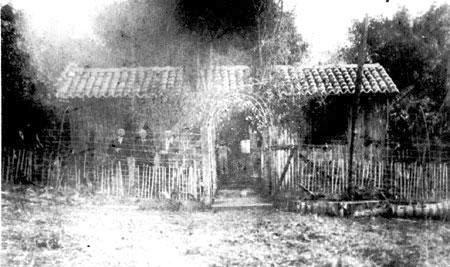 A house that belonged to the first Confederado family in Americana. (Wikipedia)
A house that belonged to the first Confederado family in Americana. (Wikipedia) Thousands of Confederates became expatriates in the years following the war, finding new homes in a variety of countries, including Canada and Mexico. Several countries greatly desired the Confederates’ presence and lured them in with lucrative deals and promises.
Emperor Dom Pedro II of Brazil, a country that had sympathized with the Confederates during the Civil War, saw great agricultural potential in the Confederates. He offered the them a tantalizing deal that included temporary lodging upon arrival in Brazil, inexpensive land, and roads and a railroad to be built in the future. One significant factor that was especially appealing to some of these Confederates was that Brazil still allowed slavery at the time.
Despite vehement protests from Confederate leaders Jefferson Davis and General Robert E. Lee, some Southerners flocked to Brazil. It is difficult to say exactly how many people emigrated--the statistics range from 2,000 to 20,000. The Brazilians welcomed the Southerners with pomp and circumstance when they arrived in Rio de Janeiro and soon bestowed upon them the name “Confederados.” Personal accounts show that the expatriates were very impressed by their welcome and optimistic about starting new lives in Brazil.
Unfortunately, their optimism was ill-placed. Life in Brazil was very difficult for the Confederados. The railroad that Dom Pedro had promised them was long in coming, and in the meantime, the colonists suffered from disease and the unforgiving climate. The Confederate colonies were spread far apart from each and were often far from markets, preventing farmers from selling their crops—assuming the crops actually grew. Several colonies failed and many Confederados returned to the United States.
Against all odds, the colony founded by Colonel William Norris, one of the first Americans to arrive in Brazil, survived. He established the colony near a village in the state of Sao Paulo in 1865. The colony, now called Americana, became home to hundreds of Confederados. As colonists grew successful, they wrote letters to the United States that enticed other southerners to join them. When the railroad finally arrived in Sao Paulo, the Confederados of Americana were there to welcome it.
The Confederado culture is alive and well in Sao Paulo today. The descendants of the first expatriates enjoy the cultures of both Brazil and the American South. Along with the Portuguese spoken by Brazilian citizens, the Confederados speak English--but with the distinct accent of the American South even after all these years. They remember their heritage with annual festivals in which men don Confederate military uniforms and women wear Antebellum-era dresses with hoop skirts. While the ideal of white supremacy seems to have dwindled amongst the Confederados throughout the years, the presence of the Confederate flag serves as a reminder that some things will just never change.
Rebecca Mast is a senior at the University of Alabama. She is an English major, minoring in creative writing and French. When she’s not searching through fascinating historical records, she enjoys reading, drawing, and playing clarinet with the Million Dollar Band.
References
Dawsey, Cyrus B., "The Confederados.”
http://www.encyclopediaofalabama.org/face/Article.jsp?id=h-3461
Herbert, Paul N. “Confederados forge new cultural identity.” The Washington Times (December 17, 2009): 4.
Soodalter, Ron. “The Confederados.” America's Civil War 26, no. 4 (September 2013): 60-65.
 RSS Feed
RSS Feed